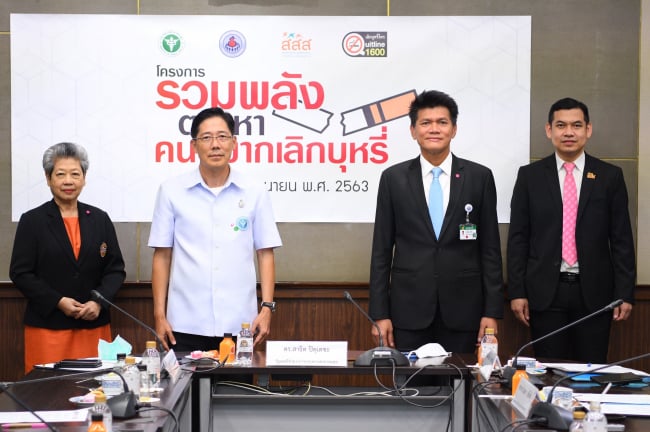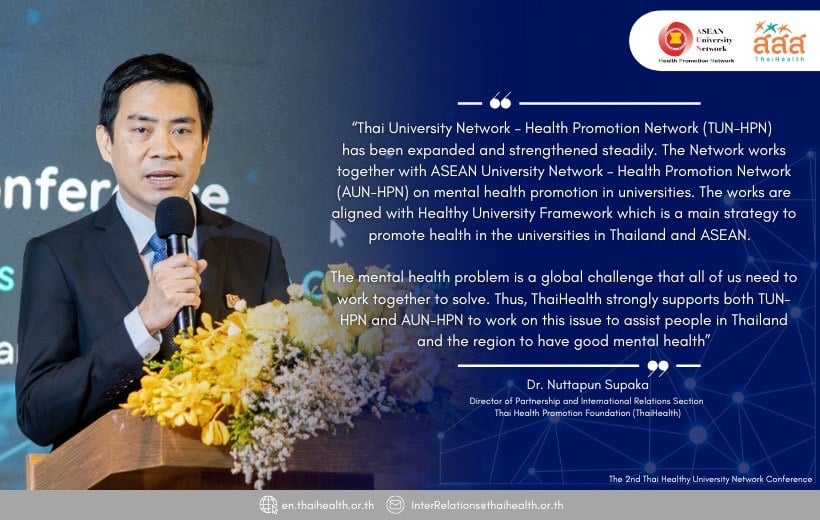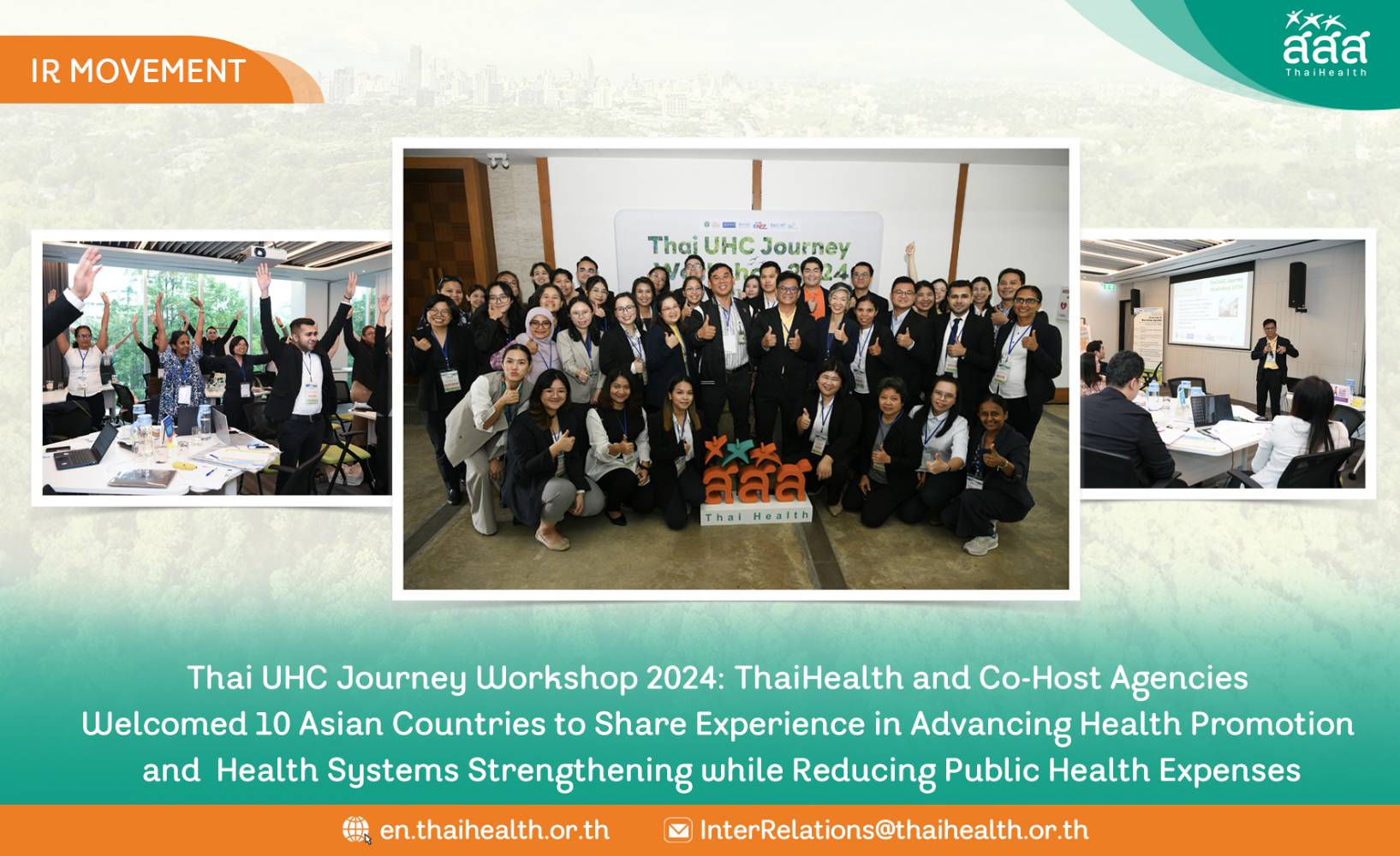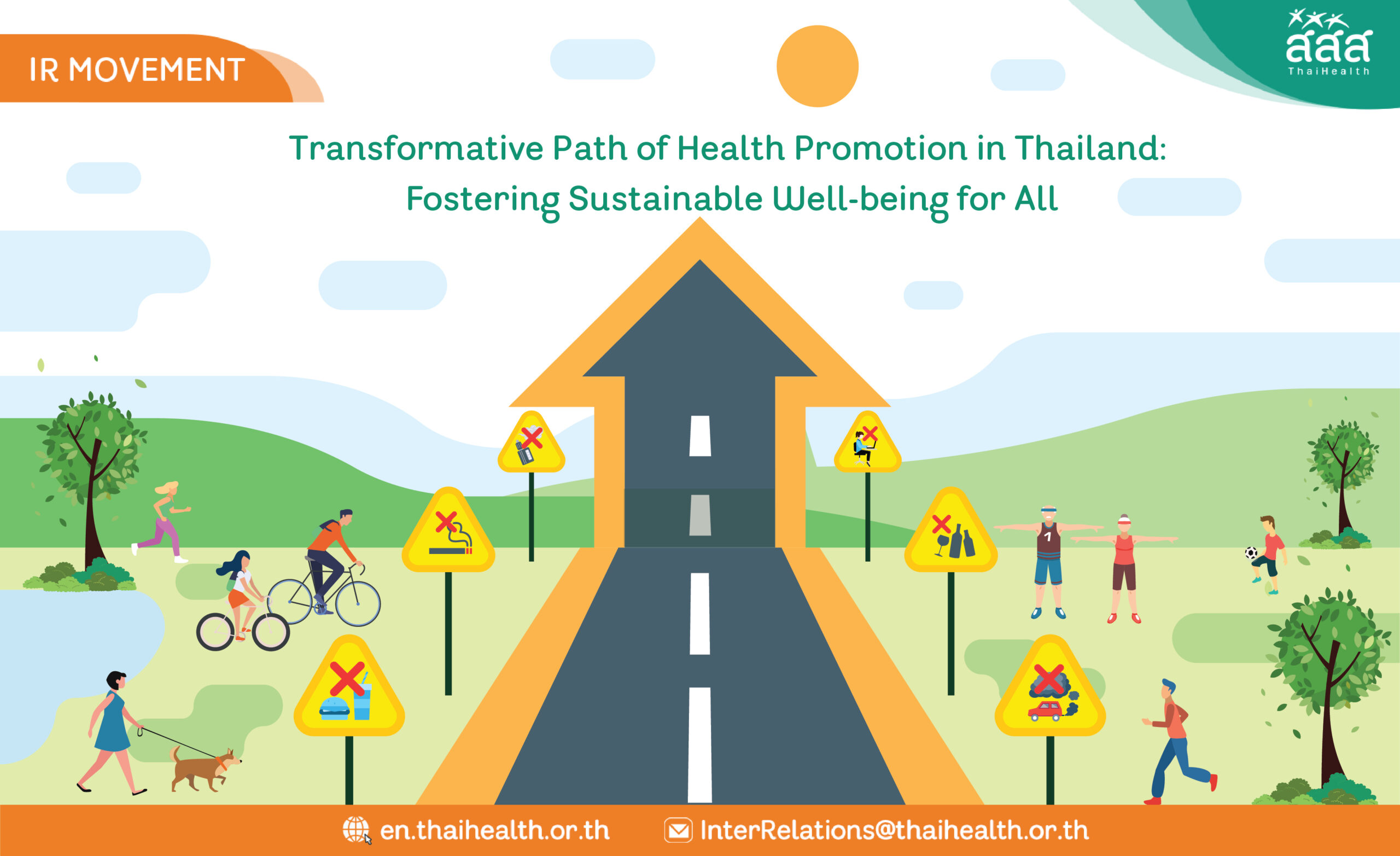
Transformative Path of Health Promotion in Thailand: Fostering Sustainable Well-being for All
The “Thai UHC Journey Workshop 2024” was jointly organized by the MOPH, ThaiHealth, the NHSO, the NHCO, and health partners, taking place under the theme: “Health Promotion: A Transformative Path towards Sustainable Health and Well-being” between November 4-8, 2024, at the ThaiHealth Center, Bangkok. Dr. Pairoj Saonuam, Deputy CEO of ThaiHealth, joined a discussion on the topic “Highlighting Health Promotion Movements in Thailand: Key Examples and Lessons.”
“Thailand has a population of around 69 million. The leading causes of mortality among Thais are non- communicable diseases (NCDs) — such as heart disease, diabetes, cancer, and chronic respiratory diseases — accounting for 77% of total deaths, approximately 400,000 fatalities per year. Given this alarming figure, the country bears a significant socio-economic burden, with annual loss due to NCDs reaching $6 billion USD, equivalent to 2.2% of its GDP.”
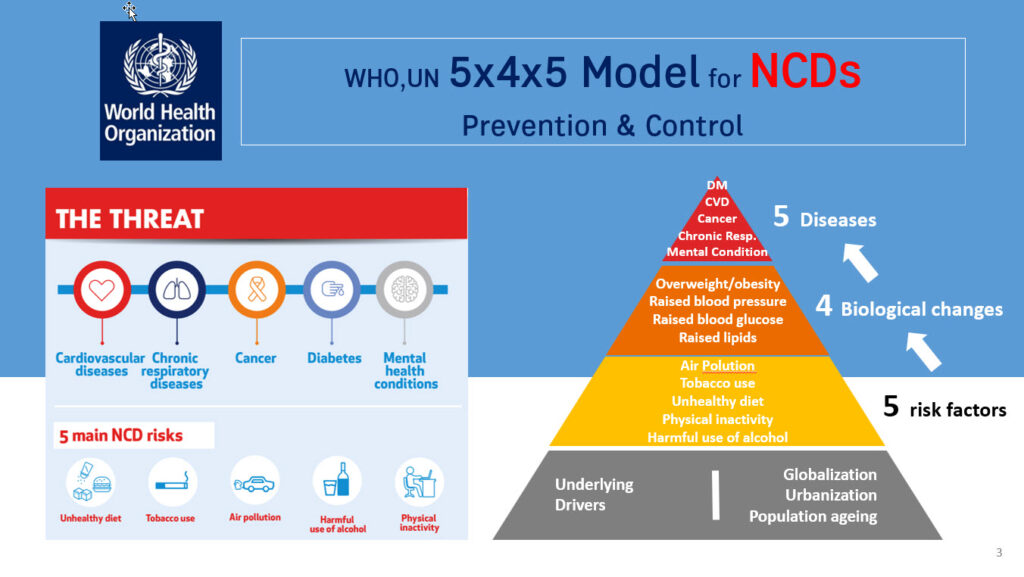
The World Health Organization (WHO) and the United Nations (UN) jointly prioritized NCDs prevention and control among their most pressing global health agenda. This model encompasses five major NCDs – cardiovascular diseases, chronic respiratory diseases, cancer, diabetes, and mental health conditions; four biological changes, such as raised blood pressure, raised blood glucose, raised lipids, and obesity; and five major risk factors, including tobacco use, unhealthy diets, physical inactivity, harmful use of alcohol, and air pollution. This framework serves as a powerful tool for tackling NCDs, fostering awareness of the importance of their prevention and control, and contributing to a healthier society.
“The determinants of health, ” which shape an individual’s health, encompass biological factors — such as age, gender, and genetics — which are inherent and unchangeable; behavioral factors, such as smoking, alcohol consumption, physical activity, and diet, which are in one’s control; social factors, such as family, community, and society, which shape behaviors and health; physical factors, such as air, water, food, housing, and access to public health services, which directly affect health; and economic factors, such as levels of income, education, and employment, which determine access to vital healthcare resources and services.
Meanwhile, “commercial determinants of health” refer to business activities, encompassing marketing, finance, research and development, and production of goods and services. These shape not only the economy but also public health through various practices, such as the aggressive marketing of unhealthy products, pollution-causing production processes, and unfair employment practices, all of which contribute to people’s health across society.
Geoffrey Rose proposed the population strategy of prevention, which focuses on altering environmental conditions and risk factors which affect the majority. This includes formulating public policies, cultivating healthy behaviors at the societal level, and emphasizing population-level prevention. By reducing the average risk of disease among the population, this approach can result in the lower number of patients and alleviate the burden on the public health system. Achieving this, nevertheless, necessitates multi-sectoral collaboration — involving the government, the private sector, and the public sector.
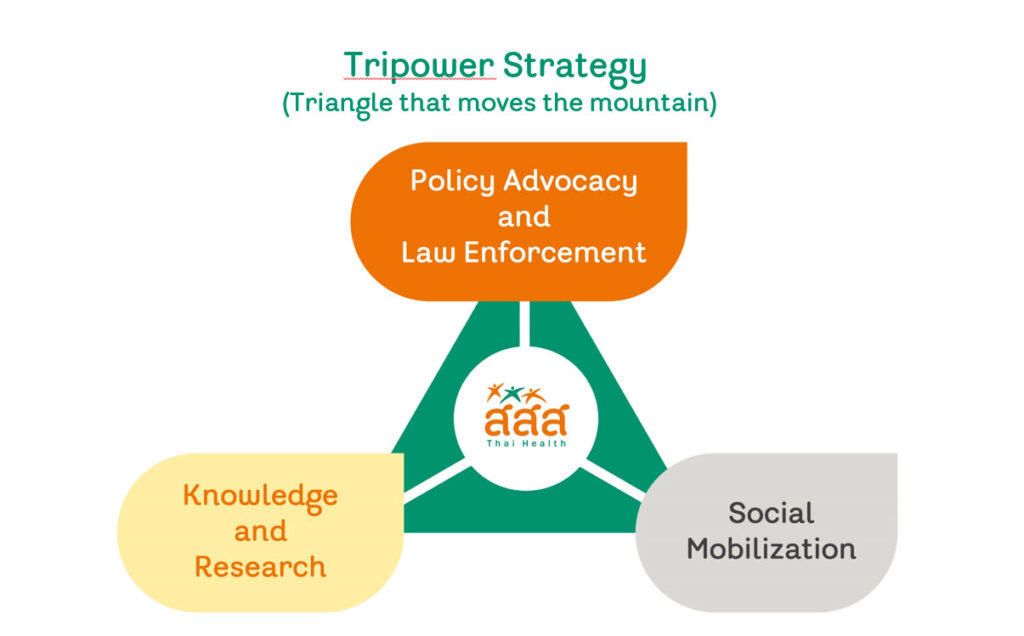
ThaiHealth’s strategy is grounded in such approach, by using the strategy of “Synergizing Three Powers” or “Tri-Power,” including “Knowledge, Policy, and Social Power.” It encompasses five key sub-strategies as follows: 1. Supporting research and driving innovation; 2. Enhancing the capacity of individuals, communities, and organizations; 3. Strengthening partnership and networks; 4. Developing policy, social, and institutional mechanisms; and 5. Engaging society through communication. These strategies work in unison to advance the health promotion movement, enabling all Thais to attain well-being across four aspects — physical, mental, spiritual, and social health. To accomplish this mutual goal, ThaiHealth unites efforts among its multi-sectoral partners, including the government, the private sector, civil society, educational institutions, and communities.
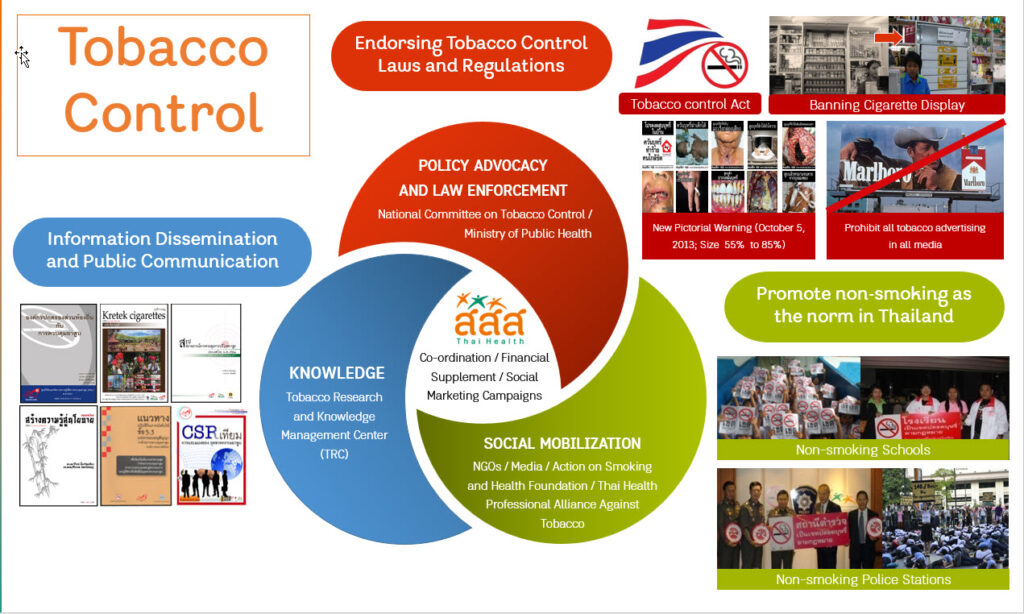
In terms of tobacco control strategies in Thailand, various aspects work in tandem to curb tobacco use and its health impacts on people. Specifically, these include: endorsement of tobacco control laws, such as the Tobacco Products Control Act B.E.2563 (2017), which enforces key measures, such as the ban on tobacco advertising and promotion, the prohibition of smoking in public areas, and the requirement of pictorial warning on cigarette packs; strict enforcement of laws; educating the public about the dangers of smoking, raising awareness about the health impacts of tobacco use and promoting smoking cessation; fostering networks and collaboration across all sectors; and communication and public relations to disseminate information about the dangers of smoking and the success of tobacco control measures. The overarching goals of these efforts are to reduce tobacco use, thereby minimizing the incidence of smoking-related diseases such as lung cancer, heart disease, and chronic respiratory diseases, decreasing national health expenditures, enhancing the quality of life for smokers and non-smokers, and establishing a smoke-free society for future generations.
Despite that, the tobacco industry employs various strategies to undermine tobacco control policies, particularly in Thailand’s case of countering the industry’s efforts to overturn the ban on electronic nicotine delivery systems (ENDS). Those strategies include creating front groups by establishing organizations or recruiting prominent figures to advocate for tobacco products or oppose tobacco control policies; lobbying politicians to enact laws or amend policies which favor the industry; running public relations campaigns through misleading or distorted information about the harms of smoking and the claimed benefits of new tobacco products; discrediting tobacco control advocates, such as experts, academics, and relevant organizations; and funding pro-tobacco research.
Challenges and potential approaches to addressing the impacts of commercial determinants of health (CDOH) are associated with the following aspects: the growing impact of commercial determinants on health, particularly public health, both positively and negatively; the lack of strict oversight and law enforcement, enabling businesses to engage in activities detrimental to health; limited knowledge and understanding among the public and policymakers about the impacts of commercial determinants on health; and opposition from businesses to policies which threaten their profitability.
The United Nations Inter-Agency Task Force Mission to Thailand on Non-communicable Diseases (UNIATF) focuses on three primary objectives to address NCDs. 1. Establishing NCDs as a national agenda and leading the national multi-sectoral efforts: All sectors – the government, the private sector, civil society, and organizations – must prioritize NCDs and work in unison to develop plans and take actions to address these issues, minimizing the rates of NCDs-related morbidity and mortality. 2. Monitoring progress: Assessments help provide insights into the progress of current efforts and refine strategies. This ensures an overall understanding of the current situation while identifying strengths and areas for improvement. 3. Investing more in health promotion: Long-term investments are indispensable for preventing the emergence of new diseases and lowering NCDs-related morbidity. Initiatives include, for instance, promoting physical activity, nutritious diets, and reducing tobacco use and alcohol consumption.
Orana Chandrasiri, the International Health Policy Program, and Sigit Dwiananto Arifwidodo, Ph.D., from the Department of Landscape Architecture, Kasetsart University, addressed the topic “Shaping the
Evidence-Based Physical Activity Policies in Thailand.”
They noted that inadequate physical activity is identified as one of the contributing risk factors for NCDs, such as heart disease, stroke, and diabetes. Despite its importance, this issue has been under-prioritized at the global level. Chronic NCDs attributable to physical inactivity not only impose a significant financial burden on public health systems but also result in workforce losses, thereby undermining productivity and the country’s economy.
Thailand has placed greater emphasis on promoting physical activity in recent years and demonstrates its capacity to lead this movement at the regional and global levels. It is equipped with human resources,knowledge, and infrastructure conducive to physical activity promotion. Additionally, various stakeholders are prepared to contribute to this movement.
Notably, Thailand has made significant contributions to advancing the global physical activity movement through its involvement in various events. Specifically, the country hosted the 6th International Congress on Physical Activity and Public Health (ISPAH), highlighting its leadership in promoting physical activity. It also contributed to the development of a global action plan by advocating for the WHO to adopt a resolution on establishing the Global Action Plan on Physical Activity. In addition, the country has fostered international partnerships, as evidenced by signing an MOU between ThaiHealth and WHO, strengthening partnerships and supporting various initiatives. More importantly, it has contributed to raising awareness about the importance of physical activity for health promotion through various events, such as conferences, seminars, and campaigns. Accordingly, efforts from Thailand and its partners have contributed to the Global Action Plan on Physical Activity (GAPPA), which functions as an instrumental tool for driving change at national and global levels.
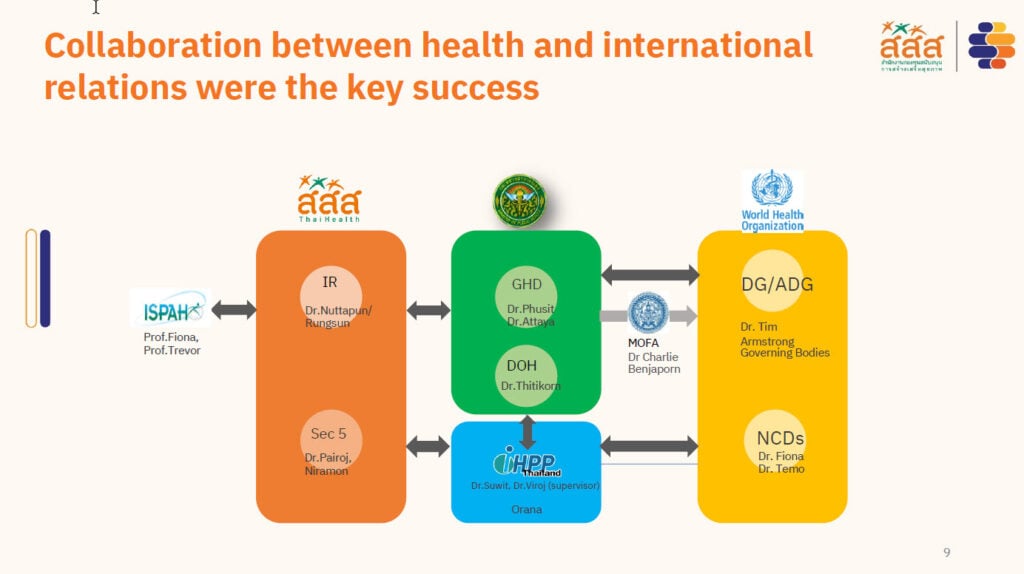
Additionally, the achievements in promoting physical activity stem from collaborative efforts among public health agencies, within Thailand and internationally. Among many contributors is the Ministry of Public Health, particularly the Department of Health, which has played a pivotal role in formulating policies and strategic plans for national physical activity promotion.
At the international level, ThaiHealth has established partnerships with international organizations, such as WHO and the International Society for Physical Activity and Health (ISPAH), to share knowledge and receive support in terms of expertise and resources. In addition, during the 69th World Health Assembly (WHA 69th) in 2016, discussions on physical activity promotion as part of the agenda aimed to assess the progress and developing approaches to achieve a 10% global increase in physical activity levels by 2025.
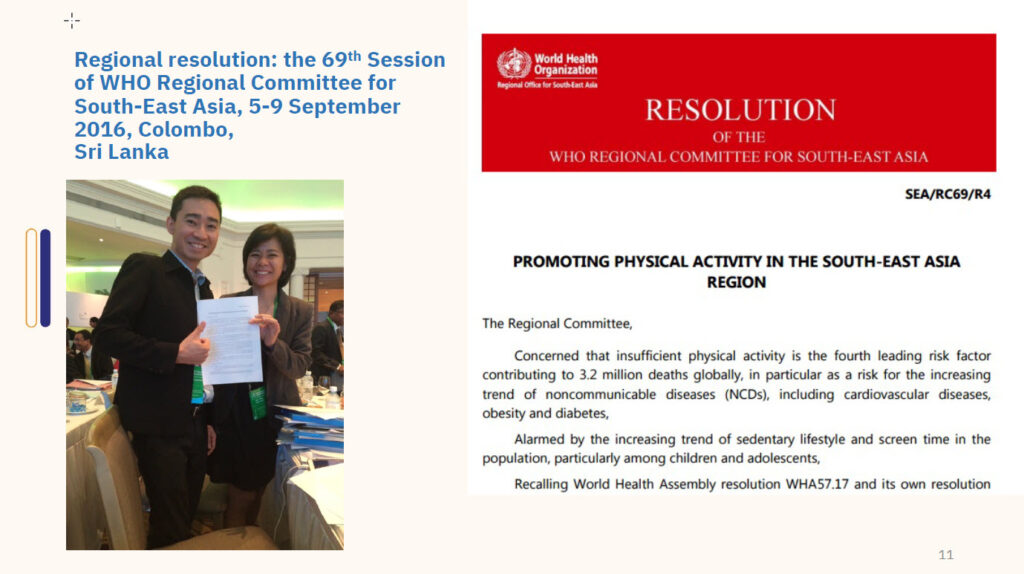
The World Health Organization South-East Asia Region (WHO SEARO) hosted a significant meeting in Sri Lanka. This event served as an important platform for bringing together member countries to assess the regional health situation, establish policies and action plans to tackle critical health issues, and share experiences and insights.
The 6th ISPAH Congress, which aimed to connect international partners in physical activity and health promotion, primarily sought to foster engagement in physical activity for better health.
Additionally, Thailand has elevated physical activity to the global agenda, which was included in the agenda of the 140th session of the WHO Executive Board. This marked a significant milestone and a victory for health advocates globally, highlighting the global recognition of physical activity as a crucial factor for public health.
In 2017, the WHO held a meeting to develop a Global Action Plan, with participation from experts across wide-ranging areas. This represented a pivotal step in fostering collaboration among member countries and partner organizations to determine approaches to address pressing global health concerns. It aimed to develop comprehensive and effective strategies to tackle shifting health challenges.
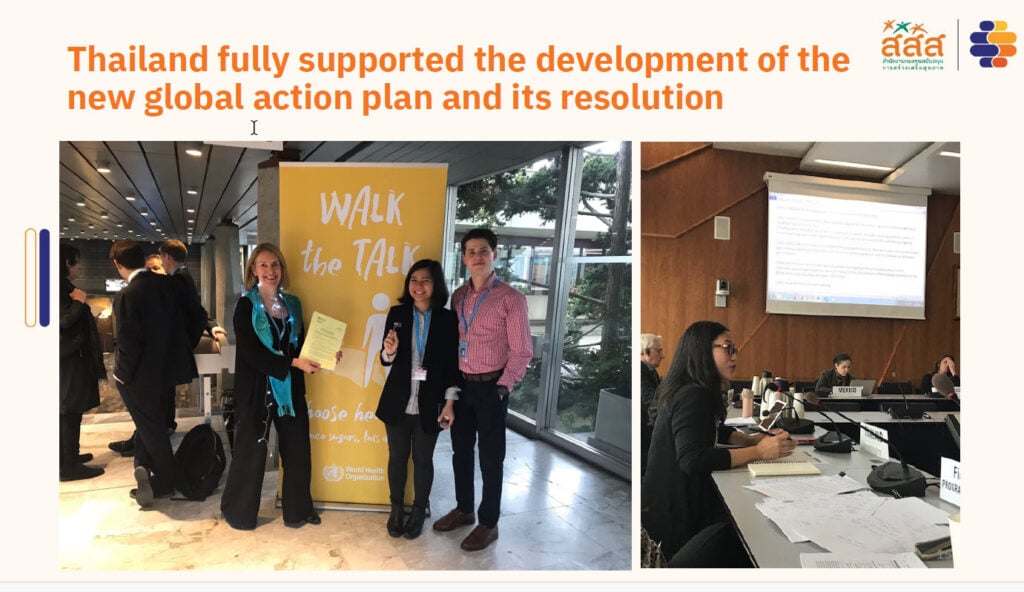
The WHO’s “Walk the Talk” event laid the foundation for a major event, “Walk the Talk: The Health for All Challenge,” which encouraged WHO staff and stakeholders worldwide to actively take actions towards achieving health for all.
The WHO has recognized the rising prevalence of NCDs – such as heart disease, stroke, and diabetes – as a global health issue which threatens the quality of life and the economy worldwide. In response, the WHO developed the Global Action Plan on Physical Activity (GAPPA) 2018-2030. This action plan draws on research revealing that increasing physical activity and curbing sedentary lifestyles can significantly mitigate the risk of developing NCDs. Additionally, physical activity enhances physical and mental health while contributing to a better quality of life and reducing the long-term financial burden of health expenditure.

In the era of globalization, health issues are no longer confined to individual nations but are interconnected globally. Pandemics, climate change, and natural disasters are among the factors affecting public health worldwide, including in Thailand. In driving physical activity, the Physical Activity National Strategy 2018-2030 is grounded in the GAPPA. Notable initiatives under this strategy are the Workout Wednesdays campaign, where government officials are encouraged to exercise every Wednesday from 3:00 to 4:30 p.m., and ActiveThai.org – a comprehensive knowledge platform on physical activity. The platform compiles a vast body of data and knowledge on physical activity in Thailand, which can be utilized in various manners. Specifically, government agencies can draw on the data to develop plans and policies for physical activity promotion while academics can utilize it for research and knowledge development. Private organizations can also develop health promotion initiatives using the data. Finally, the general public can access the resources to improve their daily routines. The platform seeks to support the implementation of the Physical Activity National Strategy and the GAPPA, thereby contributing to a healthier population with an improved quality of life.
The interconnectedness of global, regional, and national efforts to promote physical activity and the importance of collective efforts in achieving mutual goals requires the following elements. 1. Global-national movement relationship: Building mutual strength is vital. National efforts to promote physical activity require international support and collaboration. Sharing knowledge, experiences, and resources can reinforce national actions. 2. Regional impact as a catalyst for broader change: Regional actions can create ripple effects and contribute to broader change, such as advocating for physical activity as a priority in national health policies. 3. Collaboration, time, and seizing opportunities: Physical activity promotion requires concerted efforts among stakeholders at all levels – from local to global level – with a shared vision.
Dr. Piyada Prasertsom, DDS., Manager of the Sweet Enough Network, addressed the topic “Promoting Balanced Sugar Consumption: Strategies to Reduce Excessive Sweet Intake for Better Health Outcomes.”
Based on a survey conducted in 2023, over 48.35% of Thais were reported to be overweight or obese. Among children, 8.98% aged under 5 and 13.72% aged 5-18 were classified as obese. To address health and quality- of-life issues for children in the long term, ThaiHealth has established guidelines and measures as follows: promoting the consumption of healthy foods, such as vegetables, fruits, and whole grains, while reducing the intake of foods high in sugar, fat, and salt content; encouraging physical activity; supporting pre-pregnancy and
prenatal health care to ensure long-term health benefits for children; emphasizing diet and physical activity in early childhood; focusing on health, nutrition, and physical activity for school-aged children; and managing weight for children with obesity or overweight.
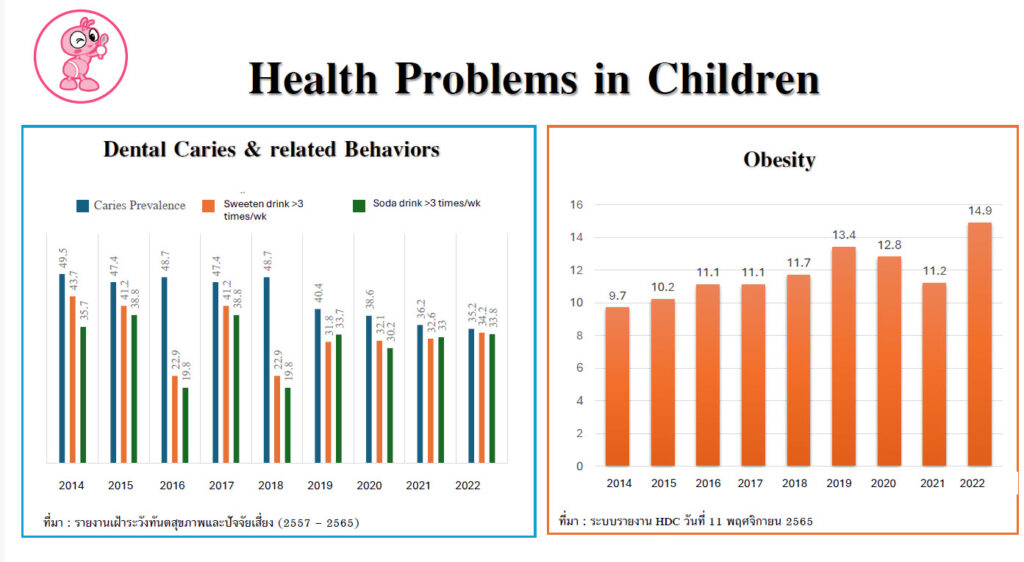
The excessive sugar intake is a major factor contributing to NCDs, such as diabetes, obesity, and heart disease. In response, the WHO has established guidelines on appropriate sugar intake to achieve better health outcomes worldwide.
Specifically, the WHO recommends reducing the intake of free sugars to less than 10% of daily energy intake, meaning that both children and adults should limit their sugar intake from soft drinks, energy drinks, sweets, and processed foods. Additionally, it is highlighted that a further reduction of the intake of free sugars to below 5% of daily energy intake can contribute to greater health benefits. Despite that, the average daily sugar consumption still exceeds the recommended levels, particularly in certain countries. Regular sugar overconsumption can ultimately contribute to long-term health issues, such as tooth decay, obesity, and other chronic NCDs.
“The Sweet Enough Network” was established in 2003 by dentists, pediatricians, and academics who recognized the health impacts of sugar consumption in children. It is aimed at curbing the overconsumption of sugar among Thai children. This initiative is built on multi-sectoral collaboration and primarily seeks to foster awareness and advocate for reduced sugar intake among Thai children, which serves as a major contributor to various diseases, such as tooth decay, obesity, and diabetes.
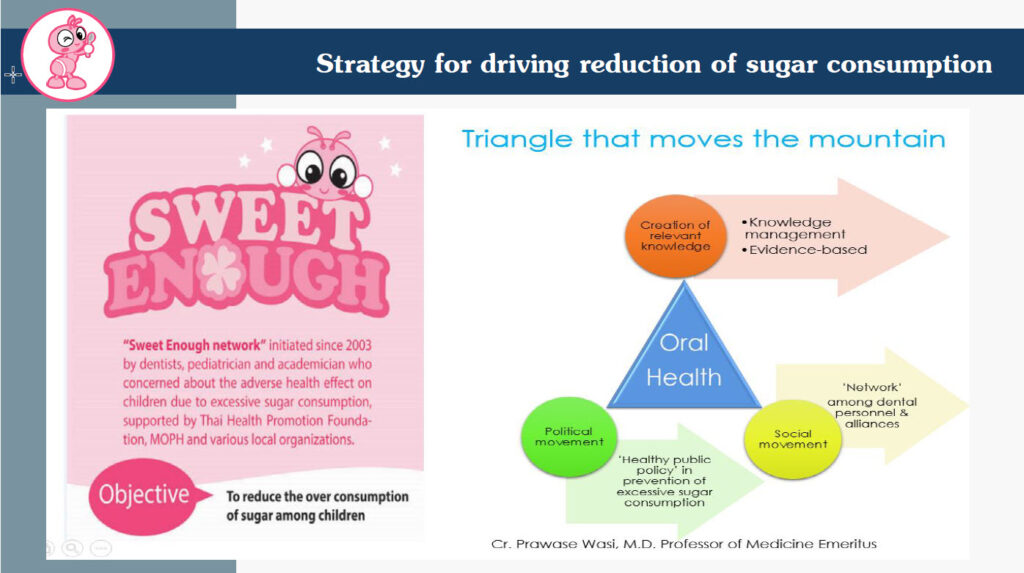
The Sweet Enough Network adopts the Tri-Power Strategy to advance its initiative: 1. Creation of relevant knowledge: producing and disseminating accurate and reliable information on the health impacts of sugar consumption; 2. Social movement: fostering public awareness and encouraging engagement to advocate for reduced sugar intake; and 3. Political movement: promoting the development of public policies aimed at curbing sugar consumption among children, and uniting efforts among various agencies – the government, the private sector, and civil society such as ThaiHealth, the Ministry of Public Health, and civil society organizations – to share knowledge and experiences, collaborate on solutions, and provide mutual support.
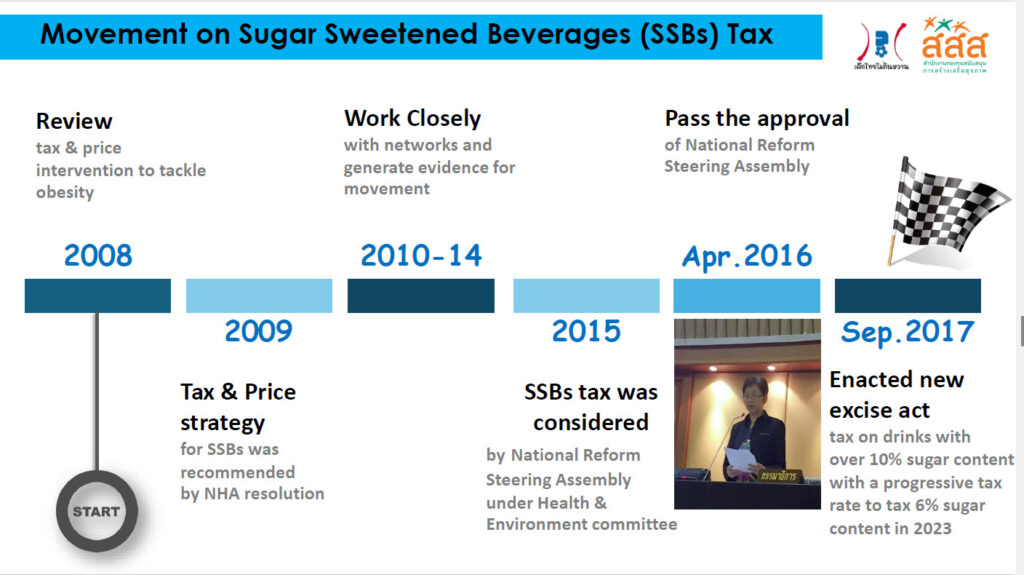
The movement on the Sugar Sweetened Beverages (SSBs) Tax in Thailand began in 2008 when ThaiHealth proposed taxing sugar-sweetened beverages. By 2017, the country enacted the New Excise Tax Law, which imposes taxes on beverages containing 10% sugar content. Additionally, a progressive tax for those with 6% sugar content was implemented in 2020. The tax applies to a wide range of beverages, including soda, carbonated drinks, sports drinks, energy drinks, flavored coffee and tea, and juice.
Three major factors contributed to Thailand’s achievement in implementing the SSBs tax. 1. Concrete evidence of positive and negative aspects of the SSBs tax: Studies have been conducted domestically and internationally to provide compelling evidence of the benefits and potential drawbacks of the tax. This enabled policymakers or decision-makers to thoroughly assess the impacts. 2. Multi-sectoral coordinated action: Addressing health issues, particularly the overconsumption of sugar, requires multi-sectoral collaboration – the government, the private sector, and the public sector. This would contribute to successful implementation of this policy. 3. Clear communication: This helped foster public awareness of the health impacts and underscored the significance of collective efforts to address these challenges.



